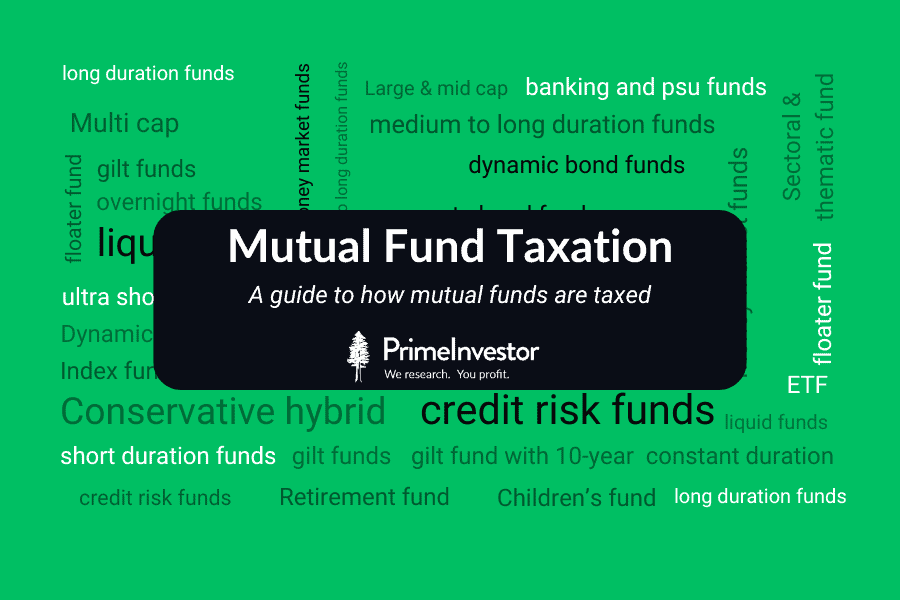Mutual fund investing saves you a lot of hassles – you don’t have to break your head over which stocks or bonds to invest in, you’re saved the stress of obsessively tracking markets and you can opt to take the SIP route to let your investing run on auto pilot.
But there is one ‘hassle’ that it does not do away with and that is of taxation. However, a good number of mutual fund categories have superior tax efficiency than regular fixed income products. This blog will simplify how different mutual funds are taxed.
Let’s start at the very beginning!

Returns on mutual funds and their tax treatment
Returns on mutual funds, can take two forms.
#1 IDCW (formerly known as dividend)
IDCW that expands to Income distribution cum Capital Withdrawal, refers to the payouts that are made periodically by a mutual fund when you as an investor choose the ‘IDCW’ option and not the ‘Growth’ option. IDCW was formerly known as ‘dividend’ but SEBI changed this to more accurately represent that the payouts are not only gains on the investments but also part of the investments that are stripped off and paid out. This blog, ‘What is IDCW in mutual funds’, will explain in more detail what IDCW is and how it works in mutual funds.
For the purposes of tax treatment, IDCW payouts are taxable in the hands of the investor. IDCW payouts will always have to be included under the head ‘Income from other sources’ and will be taxed at the slab rate applicable to the investor.
IDCW payouts will be taxable in the financial year in which you receive them even if you continue to stay invested in the mutual fund.
#2 Capital Gains
Simply put, this is the difference between the value you get when you redeem your units in the mutual fund and the amount you originally invested. These gains are taxed only when they are realised, i.e. when the units are actually redeemed.
Capital gains on mutual funds are not taxed uniformly and these are the factors that will determine how they are taxed.
- in which asset classes the fund’s assets are invested in and the proportion
- the length of time for which the units were held.
Here is how the tax treatment works for a resident individual.
Mutual fund taxation across fund categories
Now let’s apply this to the various categories of mutual funds as defined by SEBI’s Categorisation and Rationalisation of Mutual Fund Schemes.
SEBI has grouped mutual fund schemes into
- Equity schemes
- Debt schemes
- Hybrid schemes
- Solution oriented schemes
- Other Schemes
#1 Taxation of Equity schemes or equity mutual fund taxation
The following ten scheme categories fall under ‘equity schemes’ and the table below highlights the proportion of domestic equity investment these fund categories are required to have. This in turn determines the way that capital gains on redemption are taxed.
In all these schemes, since the criteria of over 65% of total assets being invested in equity is met, the gains on redemption are taxed as follows:
- Long term capital gains taxed at flat 10% over and above the first Rs. 1 lakh which is tax free.
- Short term capital gains taxed at flat 15%.
#2 Debt schemes – debt fund taxation
The list below given all the categories in debt funds – where there is no investment in equity. All the categories have the same tax treatment as given further below.
For all the above debt fund categories, redemption of investments made prior to April 1, 2023 will be taxed as follows:
- Long term capital gains (held for over 3 years) taxed at 20% with indexation benefit.
- Short term capital gains are taxed at the slab rate applicable to you.
For investments made on or after April 1, 2023, Capital gains on investments made on or after April 1, 2023 will be added to total income and taxed at the slab rate applicable to you. There will be no distinction between long term and short-term holding period for the above categories of funds.
#3 Hybrid schemes
The sub-categories of funds in the hybrid category can invest in varying combinations of equity, debt, commodity (gold) and equity/debt/commodity derivatives. Their characteristics and tax treatment are given below.
You can check on whether to use hybrid funds for superior tax treatment in this article.
#4 Solution Oriented Schemes
These funds are varied forms of hybrid funds (or pure equity funds) and their taxation would entirely depend on their equity holding.
#5 Other Schemes
In this segment, we will look at the taxation for fund categories such as index funds/ETFs, Fund of Funds (FoF) domestic and overseas.
Index funds/ETFs
This category of passive funds would need to invest a minimum of 95% in securities of index being replicated / tracked.
Tax treatment: This would depend on where the funds are invested. Gains on Equity Index funds and ETFs would be taxed as equity funds and gold and debt index funds / ETFs would be taxed in the manner of debt funds.
FoF Domestic
This category of funds (essentially a basket of other funds) would need to invest a minimum of 95% in underlying funds.
Tax treatment: This would depend on where the funds are invested. Gains on Equity Index funds and ETFs would be taxed as equity funds and gold and debt index funds / ETFs would be taxed in the manner of debt funds.
Same as for debt funds investments made prior to April 1, 2023 will be taxed as follows:
- Long term capital gains (held for over 3 years) taxed at 20% with indexation benefit.
- Short term capital gains are taxed at the slab rate applicable to you.
For investments made on or after April 1, 2023, Capital gains on investments made on or after April 1, 2023 will be added to total income and taxed at the slab rate applicable to you. There will be no distinction between long term and short-term holding period for the above categories of funds.
The exception here is for FoF defined as equity oriented as per Section 112A of the Income Tax Act where equity taxation will apply.
As per this definition a FoF scheme will be treated as an ‘equity oriented fund’ if a minimum of 90% of the total proceeds of such fund is invested in the units of such other fund and; such other fund also invests a minimum of 90% of its total proceeds in the equity shares of domestic companies listed on a recognised stock exchange.
FoF Overseas
This category of funds (essentially a basket of other funds) would need to invest a minimum of 95% in underlying funds which in turn invest in overseas equities.
Tax treatment: The taxation for this category is the same as for debt funds.
Investments made prior to April 1, 2023 will be taxed as follows:
- Long term capital gains (held for over 3 years) taxed at 20% with indexation benefit.
- Short term capital gains are taxed at the slab rate applicable to you.
For investments made on or after April 1, 2023, Capital gains on investments made on or after April 1, 2023 will be added to total income and taxed at the slab rate applicable to you. There will be no distinction between the long-term and short-term holding period for the above categories of funds.





8 thoughts on “Mutual Fund Taxation – A guide to how mutual funds are taxed”
Hi,
This is regarding LTCG on Debt funds purchased prior to 1st Apr 2023. You mentioned, the tax is 20% with indexation benefit. However, as per my reading, taxpayer can also opt for 10% tax without indexation benefit, if this option is more beneficial to taxpayer. Kindly clarify.
Hello,
Please see below excerpt from section 112 of the Income Tax Act. This benefit of choosing 10% without indexation is not available after July 10, 2014.
Hope this answers your query.
“Provided that where the tax payable in respect of any income arising from the transfer of a long-term capital asset, being listed securities (other than a unit) or zero coupon bond, exceeds ten per cent of the amount of capital gains before giving effect to the provisions of the second proviso to section 48, then, such excess shall be ignored for the purpose of computing the tax payable by the assessee :
Provided further that where the tax payable in respect of any income arising from the transfer of a long-term capital asset, being a unit of a Mutual Fund specified under clause (23D) of section 10, during the period beginning on the 1st day of April, 2014 and ending on the 10th day of July, 2014, exceeds ten per cent of the amount of capital gains, before giving effect to the provisions of the second proviso to section 48, then, such excess shall be ignored for the purpose of computing the tax payable by the assessee.”
Good Summary, is there a way we can filter out Hybrid funds that qualify for Indexation benefit (i.e >35% Equity)? Right now, it seems that we have to research individually. A filter would be of immense value in shortlisting candidates for further analysis.
We show the latest allocation in MF screener but this is not simple as for qualification for tax purpose, the average of 180 days is taken. Also, it can change drastically later. Please read this article to know why. https://primeinvestor.in/should-you-choose-hybrid-funds-instead-of-debt-funds-for-tax-benefits/
Thanks a lot for a nutshell overview.
very nice article, is it possible to put the Scheme category in MF SCREENER , so that it becomes easy for us to undetstand what taxation will apply to which MF scheme
Hello
A very lucid guide Bonds, Gsec., Gsec c 0% coupons etc?
Thank you Sir. You will find tax treatment of bonds, G-secs and NCDs covered here.